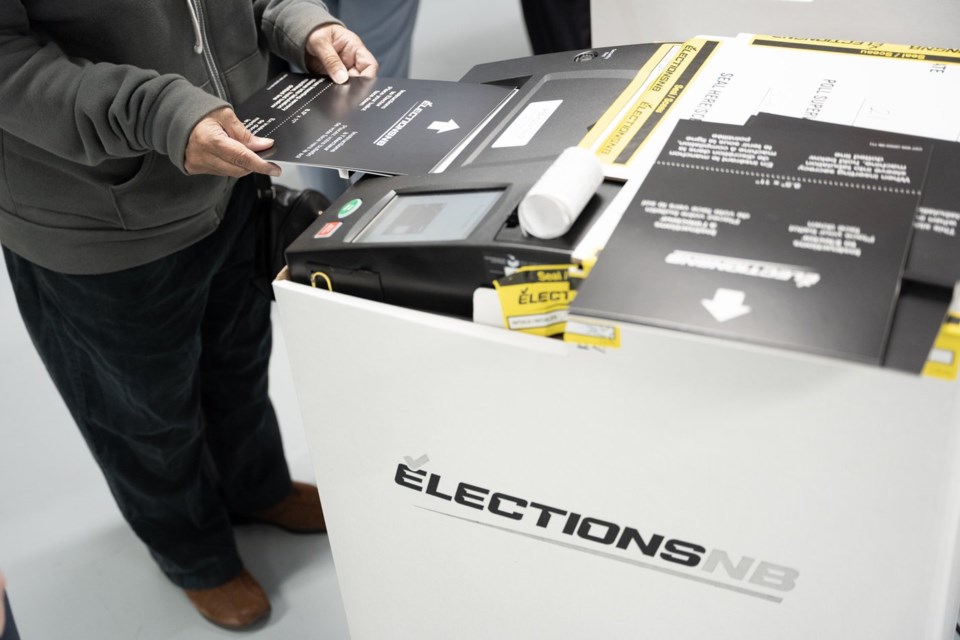FREDERICTON — New Brunswick's elections agency is warning that it has an outdated management system and faces other challenges that threaten its ability to run a free and fair vote.
In its most recent annual report, Elections New Brunswick outlined three major challenges facing the agency. The report is to be presented before a legislative committee on Sept. 23.
Aside from concerns about outdated systems, the agency also noted the need for more stringent rules to protect voter privacy and warned about the rise in foreign and domestic disinformation campaigns.
"Our current election management system, which supports the data driven processes required by election officials and other key stakeholders to administer each election, is outdated and built on multiple disconnected legacy systems," it said in the report.
In an interview, Chief Electoral Officer Kimberly Poffenroth said the agency is using an antiquated system that makes it difficult for them to plan elections. This means there's a risk in future elections that the agency won't have all the tools they need to ensure voters are directed to the right polling locations and getting the correct ballots, she explained.
"I know when we talk about the risks of the integrity of an election, people are thinking at that level about hacking of results or worries about results reporting," Poffenroth said.
"That's not what we're talking about. We're talking about our ability to effectively deliver an election. And sometimes people don't understand how important those logistical sides are."
Elections New Brunswick officials spent a "significant" amount of time working with an American company on a new system, but the government rejected the proposal, the report said.
"Unfortunately, in February 2025, our budget request for funding to proceed with the development of the election management system was turned down. New Brunswick, and the rest of Canada, was embroiled in an unpredictable trade war with the United States and there was no interest in supporting a new proposal linked to an American-based business," it said.
The agency is finding ways to improve the current systems while also looking for other vendors, Poffenroth said.
Provincial officials in New Brunswick said the speaker of the legislature was responsible for funding the agency, and referred a request for comment to the Clerk of the Legislative Assembly. The clerk was not immediately able to provide a comment.
The report also highlighted how there are little to no safeguards to protect personal information about voters once it is shared with political candidates.
Previously, a February 2025 report from Elections New Brunswick found the province's electoral data handling practices are outdated compared with other provinces, risking people's information falling into hands of extremist political parties and harassment of candidates, especially women and gender-diverse individuals.
Poffenroth warned that someone could become a candidate simply to get their hands on people's data. The voter data could be combined with other information sources to get a bigger picture, she added.
"It's really about trying to advocate for some parameters to be in place to ensure that there are privacy policies and proper training — people understand best practices in data handling."
The report also echoed warnings from a number of federal organizations about the threat posed by disinformation, supercharged by artificial intelligence and propelled by social media, which is leading to a destabilization of democratic processes such as elections.
Several federal agencies such as the National Security and Intelligence Committee of Parliamentarians, the Canadian Security Intelligence Service, the Foreign Interference Commission and the RCMP have detailed how countries such as India and China are seeking to influence voters, politicians, communities and affect election results. In a number of cases, they have warned how bad actors spread disinformation to influence election outcomes.
Disinformation is not new to the realm of politics, Poffenroth said.
"But it's the ease with which it can be created and the ease with which it can be disseminated, and there really are no rules around how that can be used in the context of elections in New Brunswick," she said.
"Other jurisdictions are taking steps in that direction, and I think it's important for our political leaders to look at what's being done and try and come up with the appropriate response for New Brunswick."
Giving an example of how disinformation could be spread, she said it's not illegal under New Brunswick law to send out fake information on the date of the election.
It becomes a "bit of a vicious cycle" when people are attuned to the fact that they're not sure they can trust anything they are hearing or seeing, but also don't necessarily believe information that actually is accurate, she said.
While there were no concerns that the agency saw in the provincial elections last fall, Poffenroth said she wants to be proactive rather than reactive in combating disinformation.
"We really need to educate the public to be careful about what they're reading ... but to know where to go to get reliable information," she said.
"It's not just about putting offences in place in this ever evolving world, and it's constantly changing, the rules need to be flexible enough to accommodate that change."
This report by The Canadian Press was first published Sept. 4, 2025.
Hina Alam, The Canadian Press



